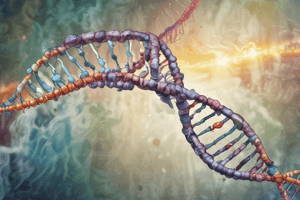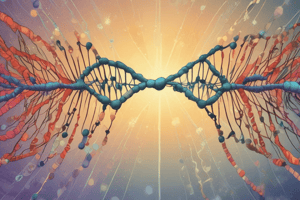Podcast
Questions and Answers
What is the difference between paracentric and pericentric inversions?
What is the difference between paracentric and pericentric inversions?
- Both paracentric and pericentric inversions include the centromere.
- Neither paracentric nor pericentric inversions include the centromere.
- Pericentric inversion includes the centromere, while paracentric inversion does not. (correct)
- Paracentric inversion includes the centromere, while pericentric inversion does not.
Which type of chromosomal abnormality involves the changes in the number of chromosomes?
Which type of chromosomal abnormality involves the changes in the number of chromosomes?
- Translocations
- Polyploidy (correct)
- Reciprocal translocations
- Inversions
What is the main difference between aneuploidy and polyploidy?
What is the main difference between aneuploidy and polyploidy?
- Aneuploidy involves translocation of chromosomes, while polyploidy involves inversion.
- Aneuploidy involves missing chromosomes, while polyploidy involves extra chromosomes. (correct)
- Aneuploidy involves extra chromosomes, while polyploidy involves missing chromosomes.
- Aneuploidy involves inversion of chromosomes, while polyploidy involves translocation.
What characterizes nonreciprocal translocation?
What characterizes nonreciprocal translocation?
In what situation would the chromosome fail to move to the spindle pole during cell division?
In what situation would the chromosome fail to move to the spindle pole during cell division?
Which type of inversion does not include the centromere of the chromosome?
Which type of inversion does not include the centromere of the chromosome?
A child with Cri-du-chat syndrome is most likely to exhibit which physical characteristic?
A child with Cri-du-chat syndrome is most likely to exhibit which physical characteristic?
What is the main consequence of chromosome segment deletions in terms of cell division processes?
What is the main consequence of chromosome segment deletions in terms of cell division processes?
Which syndrome is characterized by seizures, mental retardation, and a deletion on chromosome 4?
Which syndrome is characterized by seizures, mental retardation, and a deletion on chromosome 4?
In reciprocal translocation, what happens to chromosome segments between two non-homologous chromosomes?
In reciprocal translocation, what happens to chromosome segments between two non-homologous chromosomes?
What distinguishes Prader-Willi syndrome from other syndromes mentioned?
What distinguishes Prader-Willi syndrome from other syndromes mentioned?
How does reverse duplication differ from normal duplication?
How does reverse duplication differ from normal duplication?
What is the main difference between structural abnormalities and numerical abnormalities in chromosomes?
What is the main difference between structural abnormalities and numerical abnormalities in chromosomes?
Which of the following types of structural abnormality involves the doubling of a specific chromosomal segment?
Which of the following types of structural abnormality involves the doubling of a specific chromosomal segment?
In terms of effects on individuals, what does the text suggest about chromosome loss and chromosome gain?
In terms of effects on individuals, what does the text suggest about chromosome loss and chromosome gain?
What do inversions refer to in terms of chromosomal abnormalities?
What do inversions refer to in terms of chromosomal abnormalities?
If a reciprocal translocation occurs between two non-homologous chromosomes, what happens?
If a reciprocal translocation occurs between two non-homologous chromosomes, what happens?
Which term best describes the loss or gain of whole chromosomes?
Which term best describes the loss or gain of whole chromosomes?



